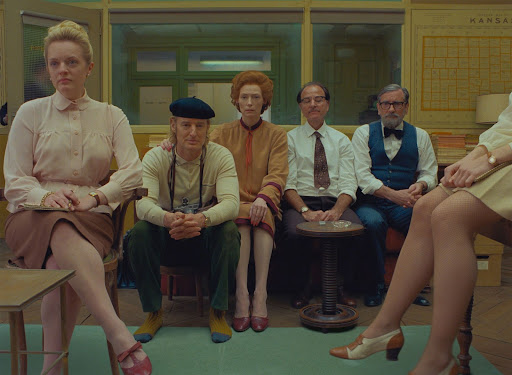The French Dispatch: A Love Letter to Journalism and the Art of Storytelling

Image courtesy of The New Yorker
By Margaret Adams
Wes Anderson returns to the big screen with The French Dispatch, a marvelous and inspired film about story-telling and nostalgia.
The story follows the death of Arthur Horowitz, Jr., played by Bill Murray, who was the Editor-in-Chief of a newspaper named The French Dispatch. The rest of the editorial staff decides to publish a commemorative edition of the newspaper, which includes three of the best stories from the last decade. The film takes place in Ennui-sur-Blasé in France, the town out of which the magazine publishes.
This film features one of the most incredible casts I have ever witnessed: not only are there reappearances from Anderson’s usual cast, like Bill Murray, Owen Wilson, Tilda Swinton, Edward Norton, and Saorise Ronan, but it also has performances from Timothée Chalamet, Frances McDormand, Jeffery Wright, Adrian Brody, Elizabeth Moss, Willam Dafoe, Benicio Del Toro, Jason Schwartsmann, Henry Winkler, Lois Smith, and Anjelica Huston.
The film is a collection of three different stories, written by the writers at The French Dispatch, inspired by their experiences. The stories are all connected by the ideas of love and passion for art and the conviction to do the right thing.
The film is based off of The New Yorker’s founder and editor, Harold Ross, who allowed his famous team of writers to write to their heart’s desire. All three stories were inspired by real stories written by the team of writers under Harold Ross, including James Baldwin, Mavis Gallant, and A.J. Leibling.
While Anderson’s films are always a pleasure to watch, there is so much about this film that differs from Anderson’s previous works; one of the most jarring differences is how available it is to the imagination. While Anderson always portrays a clear vision and is notoriously mission-oriented in every single single shot, this film does allow the viewers to indulge in the nostalgia in little weird and personal ways.
This leads us to one of the most important ideas: the intimacy of details. The details of Anderson’s films—with the set, the direction, the delivery of lines, the color palette—are what bring us so much closer and more personal. Nostalgia is a huge theme throughout the film; while the viewers might not feel nostalgic for the same things Anderson is portraying, we still recognize and feel nostalgia through these choices. Anderson continues to meet his audience in the details in this way.
Some of the best performances throughout the film were Frances McDormand and Jeffery Wright. These two stood out particularly because they both were able to retain so much control on-screen, despite Anderson’s clear, recognizable, and specific direction; McDormand commanded the scene even when she was not even central to it! Wright also delivered his lines beautifully, making his story a favorite out of the three main stories.
One of the best parts of the film is the score. The score accompanies and elevates the details that Anderson places so particularly throughout. The pickity-piano solidifies and helps carry the emotions throughout the film, making continuous and fluid what could have easily been so jarring and detached. To put it simply, Alexandre Desplat never misses.
The experience of watching this film is one I will always remember—viewers will walk out of the movie theater full of love and appreciation for language and the beauty and responsibility of rhetoric.
Like Sheila O’Malley said in her review of the film, “[i]t’s a fast-paced delirious movie about a very slow unchanging world.”
The French Dispatch is currently playing in theaters everywhere.







